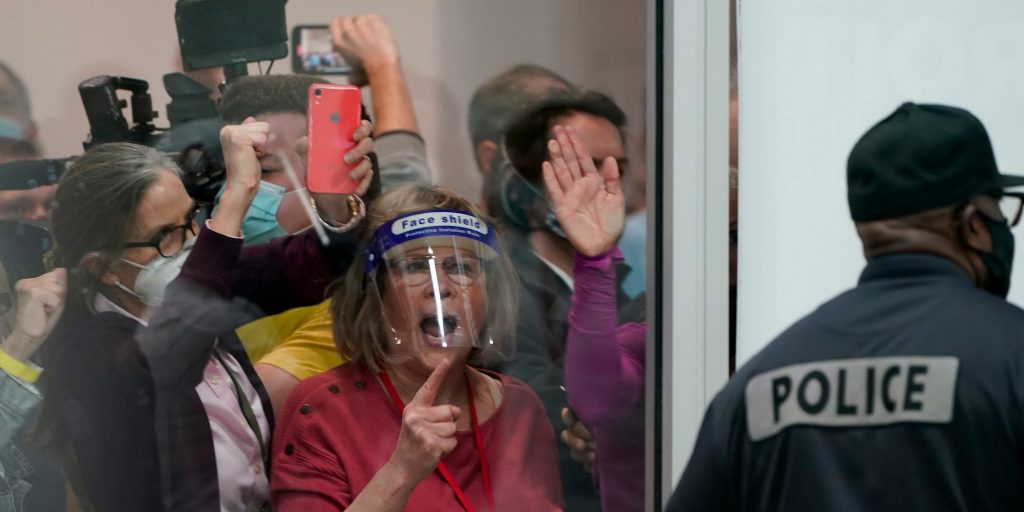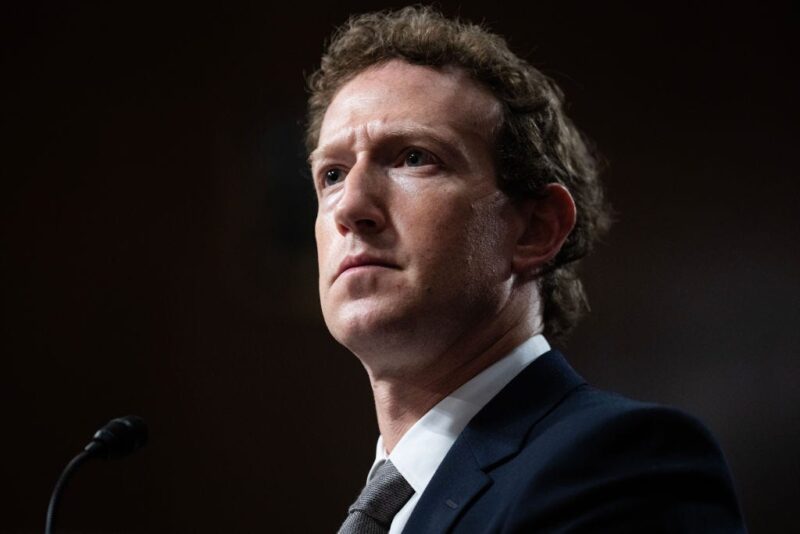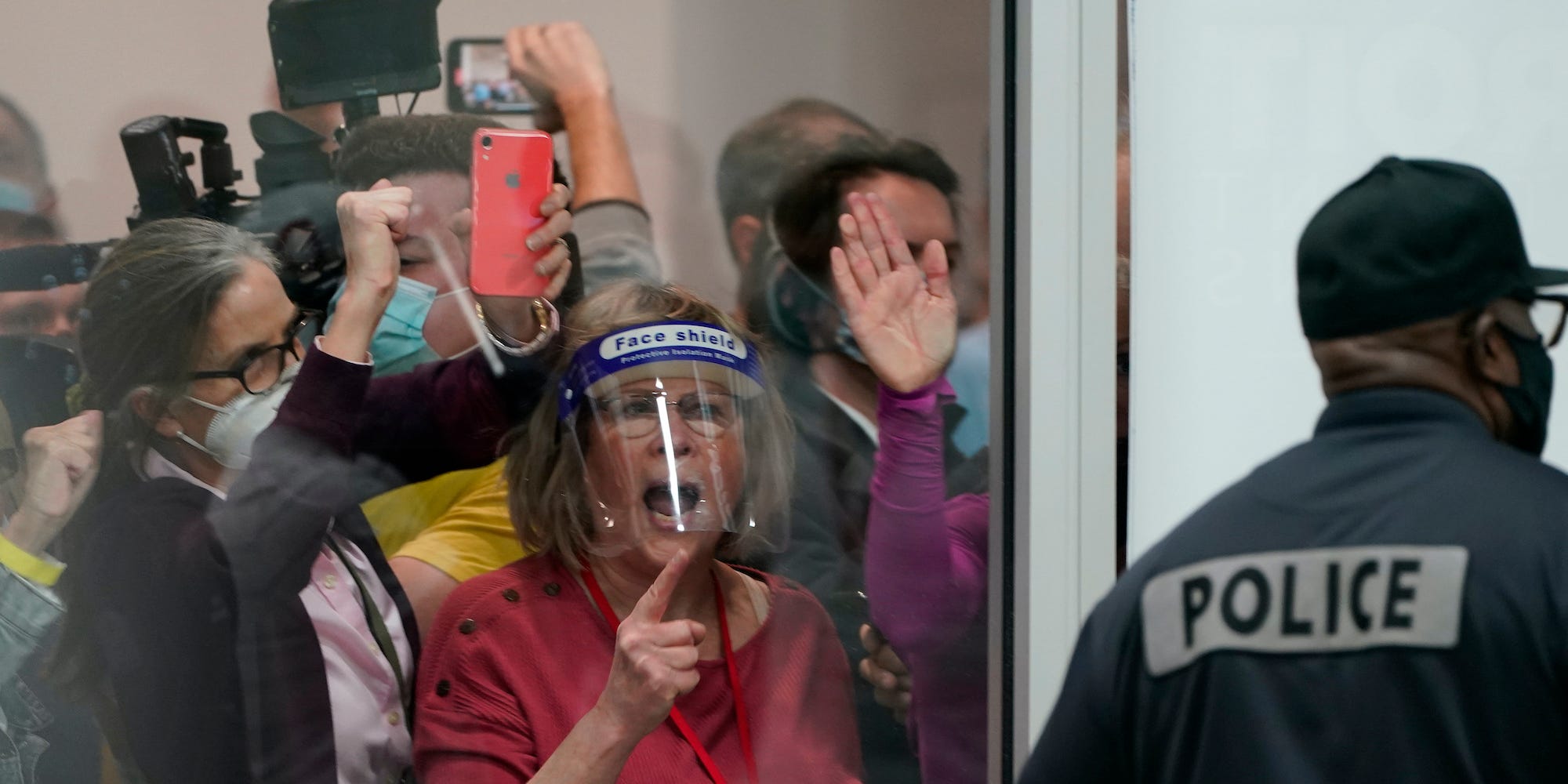
AP Photo/Carlos Osorio
- Arizona and Michigan election officials on Wednesday appealed to Congress to address threats and harassment.
- They testified one day after officers relived the harrowing Capitol attack in a widely-watched hearing.
- "All of us have been threatened simply because we're trying to represent our community," Detroit City Clerk Janice Winfrey said.
- See more stories on Insider's business page.
Adrian Fontes, the former top election official in Maricopa County, Arizona recalled a bomb squad being called to his house in 2018 after his daughter brought in an unidentified package. By November 2020, he shared in written testimony, Fontes had prepared "go bags" for his daughters and dealt with direct threats to his staff that required law enforcement protection as pro-Trump protesters engulfed the office where workers were counting ballots.
After a rash of harassing text messages and calls in the wake of the 2020 election, Detroit City Clerk Janice Winfrey recounted a man approaching and physically threatening her in her own neighborhood. "I have COVID-19 and I'll spit on you," Winfrey responded at the time.
Later, she testified, the man messaged her on Facebook threatening to blow up her block, with continued threats against her requiring law enforcement attention as recently as February.
On Tuesday, four law enforcement officers shared in a nationally-televised House hearing emotional, vivid recountings of their experiencing defending the Capitol during the January 6 insurrection. The next day, Fontes and Winfrey shared with Congress their own stories of facing threats of violence for defending the outcome of the 2020 election.
In Wednesday's smaller and more sparsely-attended hearing held by the House Committee on Administration, Fontes and Winfrey appealed to Congress for help addressing the root causes of the insurrection: pervasive GOP-backed efforts to undermine and subvert election results that escalated into threats against local election officials and, ultimately, the Capitol riot.
Gowri Ramachandran, senior counsel at the Brennan Center for Justice, argued in the hearing that the January 6 insurrection was, in essence, an attack on election officials since members of Congress were attacked for fulfilling their duty to count electoral votes and affirm the winner of the Electoral College.
"We encourage you to continue to listen to the voices of those who are most directly responsible for making our democracy work in service of this Republic," Fontes told the committee. "We need your help. We need your protection."
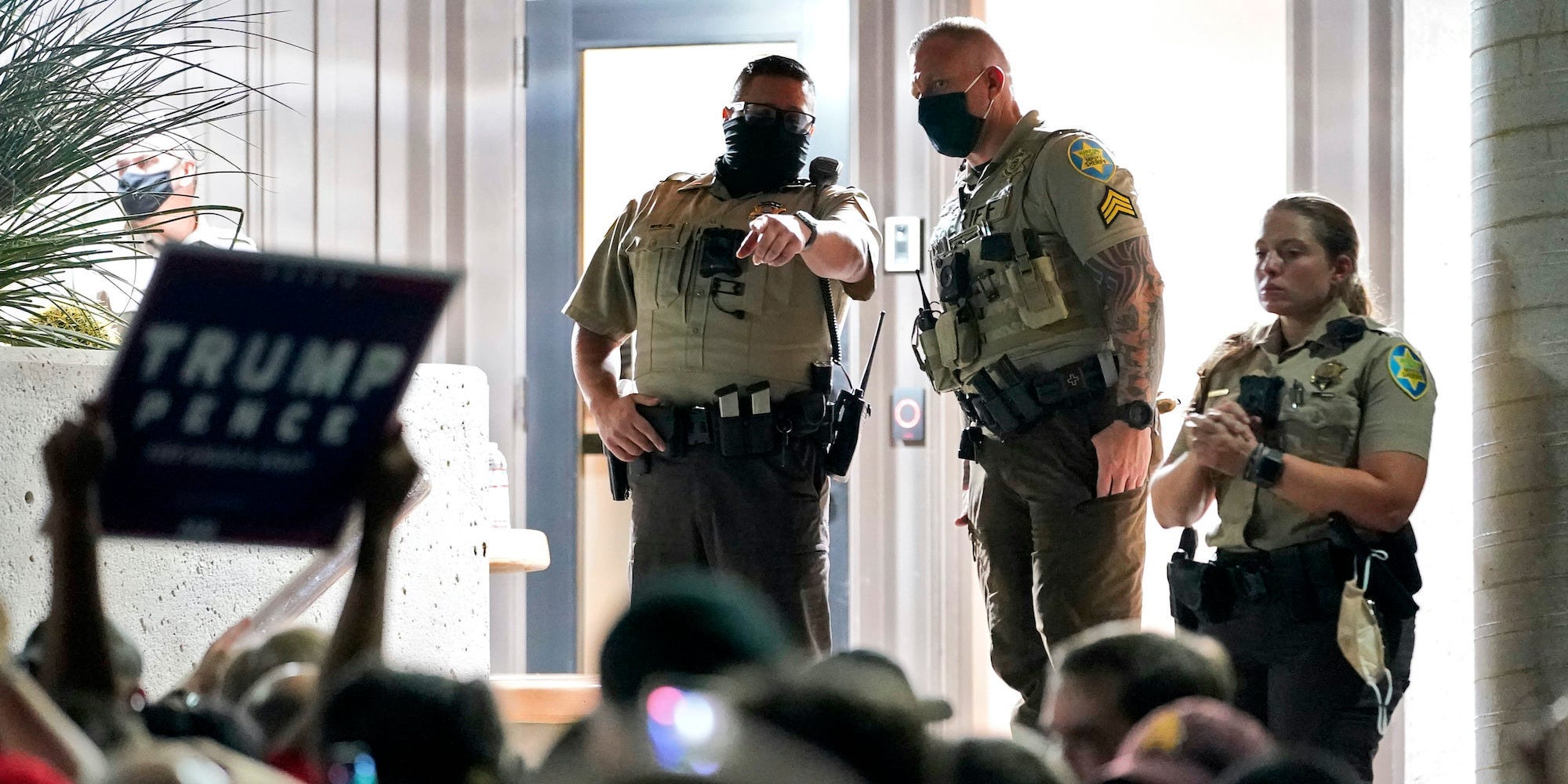
AP Photo/Matt York
After Senate Republicans filibustered the For the People Act, also known as S.1, Democrats' sweeping voting rights and democracy reform bill, in late June, election policy has taken a backseat to the landmark bipartisan infrastructure deal. But with the select House committee investigating January 6 putting political violence back in the spotlight, the witnesses hope Congress will also act on threats against election officials.
"I think bringing the real stories of real election officials across the country at the local, municipal, and county level is important for these folks to hear. I don't know that they get a lot of stories told to them," Fontes, now a Democratic candidate for secretary of state in Arizona, told Insider in an interview after the hearing.
Without the work of local officials, 'none of you would be here in this room'
A recent report from the Brennan Center and other think tanks found that one in three election officials now feels unsafe in their jobs and one in five identified threats to their safety as a concern they face at work, compounding the low pay and lack of resources these officials have contended with for years.
"All of us have been threatened simply because we're trying to represent our community. If it weren't for the work of local election officials, none of you would be here in this room. We just want to uphold democracy. We just want to ensure everyone votes," Winfrey told the committee.
"I feel afraid," she added.
The physical threats have now been followed by efforts in GOP-controlled state legislatures to strip election officials of power, criminalize the work done by election officials, and exact more partisan influence into election administration.
A June report from Protect Democracy, States United Democracy Center, and Law Forward found that 14 state legislatures passed 24 laws that criminalize aspects of the election administration process and give partisan officials more control over how elections are conducted and certified.
Democratic lawmakers have responded with the Preventing Election Subversion Act of 2021, which would prohibit local election officials from being fired without cause, make it a federal crime to harass or threaten an election official, and establish more protections against voter intimidation.
Republicans on the committee largely didn't engage with the physical threats described by the election officials, instead decrying the anti-election subversion bill as a federal takeover of elections and criticizing Democrats for vastly exaggerating the impacts of GOP voting laws for their own political advantage.
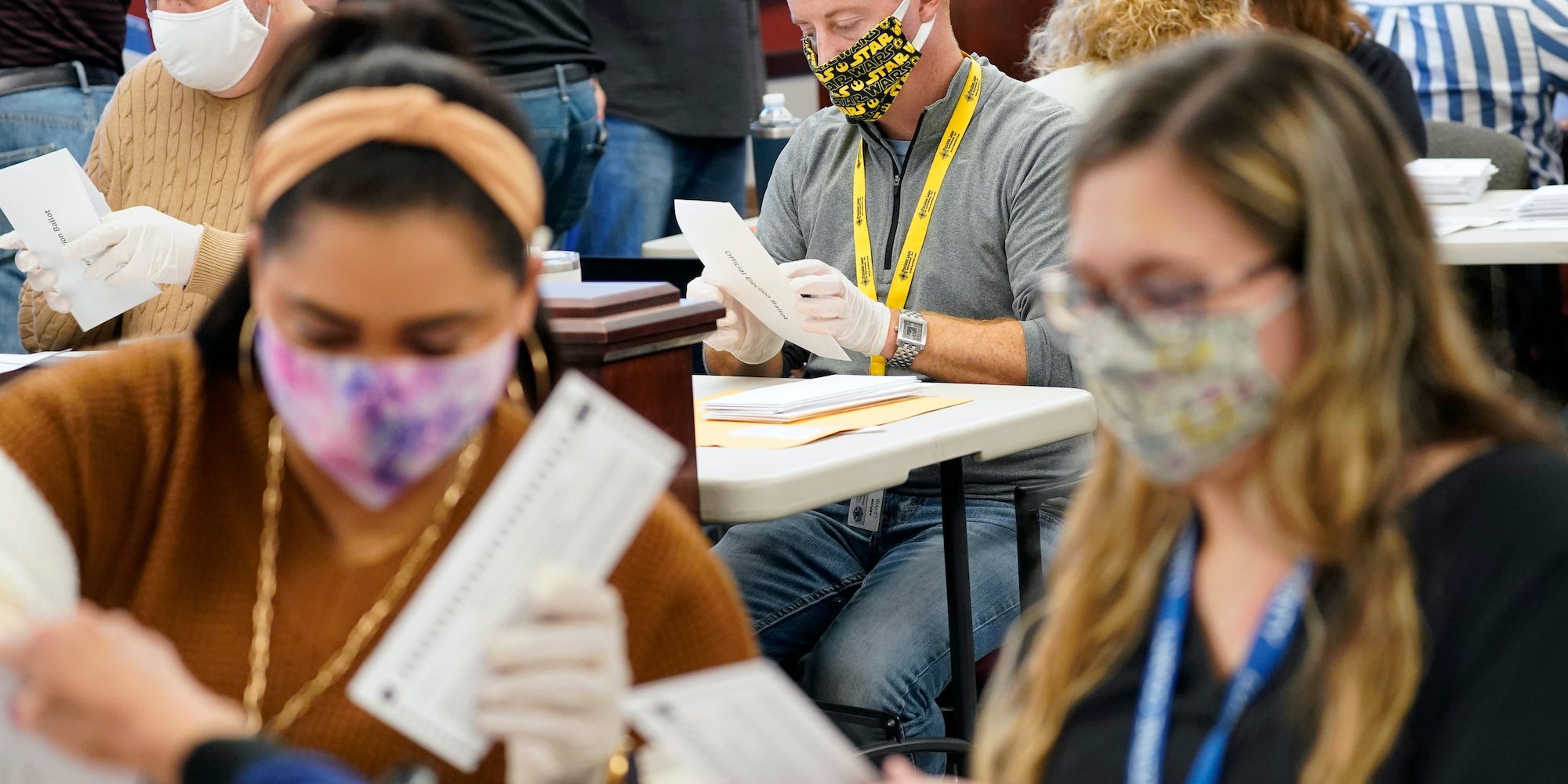
AP Photo/Mary Altaffer, File
GOP lawmakers lack 'the courage to face responsibility for their own dangerous rhetoric'
Fontes, for his part, expressed dismay to the GOP's "overblown" reaction in the hearing, telling Insider it "betrays a sense of desperation."
"They're grasping at straws to keep Americans from being protected for political gains, and that's too bad," Fontes said.
The election officials that process registrations, send out absentee ballots, and open polling sites at the crack of dawn for Democratic and Republican voters alike are now getting burned out and retiring in unusually high numbers.
And while burnout and threats aren't exclusive to officials of any party, Fontes told Insider that GOP lawmakers casting doubt on election results or looking the other way when it comes to conspiracy theories fuels threats and harassment that election officials face in their communities.
"They avoided it on purpose because they know their rhetoric is what's causing this," he said.
Fontes continued: "They're embarrassed about it, and they're running away from it, and that was painfully obvious from the questions that they asked, and the questions that they didn't ask. And it's too bad that they don't have the courage to face responsibility for their own dangerous rhetoric."
While the hearing was ongoing, The Washington Post reported that on the other side of the Capitol, a group of Democratic senators met with Majority Leader Chuck Schumer to work out a revised, possibly slimmed-down version of S.1. While details on the new bill are so far scant, it could include elements of the Preventing Election Subversion Act.
"We're working on as comprehensive of a package as we can get the votes for," Sen. Alex Padilla of California, who previously served as the state's chief election official, told Insider at the Capitol on Wednesday evening.
Meanwhile, Fontes, who in 2020 ran an election where he was on the ballot and lost, told Insider that he hopes "the grown-ups can get back into the conversation and help folks understand that this is something that ought not to be politicized. This is something that you can be reasonable about, and that it's OK to lose."
"That's what elections are for - to make a decision. And you won't always win, and that's OK," he said.

